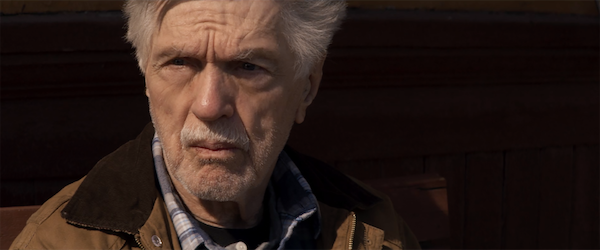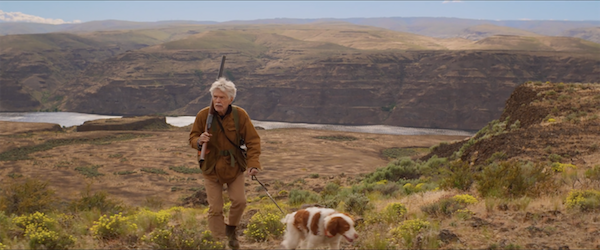A sense of foreboding suffuses East of the Mountains, a low-key drama based on a David Guterman novel. Set in the photogenic wilds of Washington’s Columbia Basin, the movie explores mortality in the person of an aging surgeon played by Tom Skerritt. A consistently reliable performer over his long career, Skerritt is being honored at this year’s Seattle International Film Festival for “Outstanding Achievement in Cinema.”

In Thane Swigart’s script, Skerritt’s Ben Givens has reached a state of despair. Still grieving over the death of his wife a year earlier, he lives in an austere suburban house filled with mementoes. Alone apart from his setter Rex, Ben toys — apparently daily — with the idea of suicide.
That’s a deep hole for director S.J. Chiro to work from, and at first East of the Mountains threatens to either sink into sentimentality or force its way into a narrative of redemption. Fortunately, Skerritt doesn’t try to appeal to viewers’ sympathies. Tight-lipped and undemonstrative, Ben refuses to admit his depression, or to ask for or accept help from his daughter Renee (Mira Sorvino). Instead, he embarks on a hunting trip with Rex.
Skerritt’s craggy face and frail frame fit in perfectly with cinematographer Sebastien Scandiuzzi’s autumnal landscapes. Expanses of brush, distant rivers, blazing sunsets emphasize the sense that this may be Ben’s last time in the wilderness. And Skerritt’s awe at his surroundings is palpable, lifting up the tone and spirit of the movie.
When Rex is wounded, Ben has to summon the skills to rescue him. He also has to reach out for help: from a passing stranger; from Anita (Annie Gonzalez), a vet in his old hometown; even from Aidan (Wally Dalton), his brother. In the process, Ben begins to open up about his past, his losses, his doubts.
As the film progresses, Swigart dispenses with much of Guterman’s plot, zeroing in on how Ben responds to Anita, a cheerful, optimistic, but still clear-eyed woman raising a nephew in difficult circumstances; and to Bill Harden (John Paulsen), a temperamental bully who steals Ben’s heirloom shotgun. Even with Bill, the script is more nuanced than its good vs. evil themes might suggest.

So is Chiro’s direction. The film is more interested in the how of its characters than the why. The best path across a field, the way to carry a shotgun, shooting and cooking game, stitching wounds — showing rather than telling, letting the characters reveal themselves through their actions.
When Ben does talk, Skerritt is mesmerizing. His eyes, darting and piercing, add volume and conviction to his voice. An anecdote about the Korean War isn’t just a gripping story, it helps explain how Ben became who he is. Skerritt delivers it flawlessly, without drawing attention to his technique.
Whenever East of the Mountains threatens to become too gooey, Chiro manages to shift gears. Ben and Aidan start out prickly and remain that way, old slights and recriminations preventing them from reconciling.
Gauzy, soft-focus flashbacks to Ben’s early life throw the film out of balance. Guterman had the space to explore his characters’ thoughts and memories, but here a flashback of young lovers is just that and nothing more. It’s a technique that threatened to undermine similar movies like Out Stealing Horses and Last Orders, also adapted from well-regarded novels with elderly protagonists.
Its weak ending aside, East of the Mountains is surprisingly satisfying. Despite its solemn tone and themes, this is a movie whose heart and decency are irresistible.
East of the Mountains premiered at the Seattle International Film Festival.


